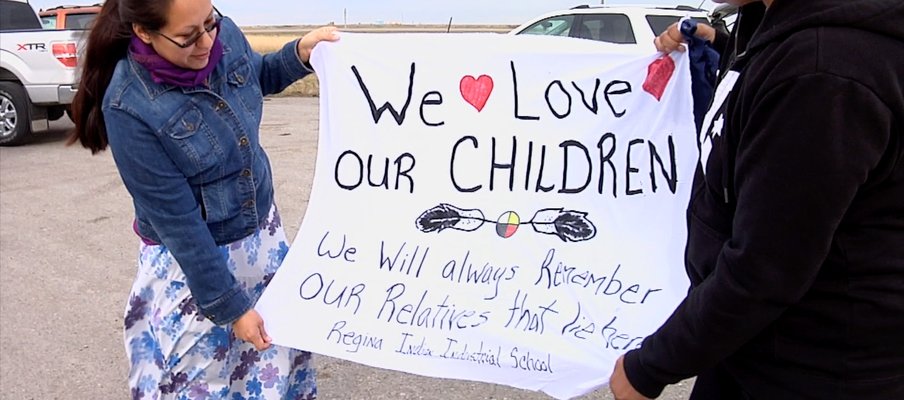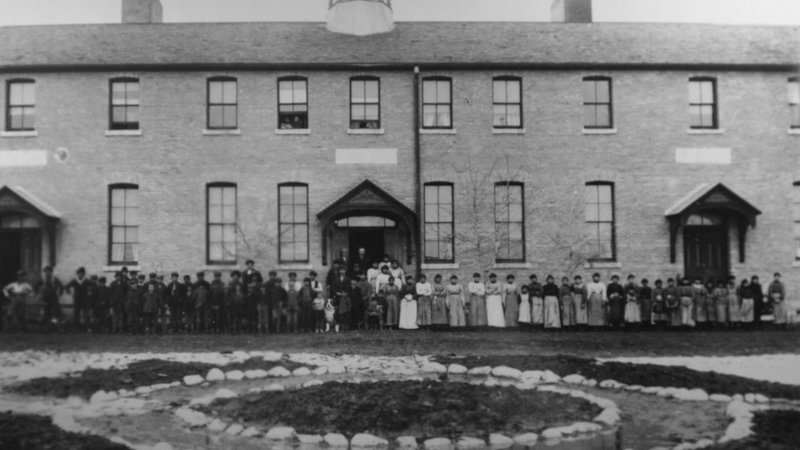RIIS to the Path of Healing

Two filmmakers have brought a little-known part of Saskatchewan back to life thanks to a new film that explores stories of discovery and healing.
Saskatchewan filmmakers Janine Windolph and Trudy Stewart were approached by the United Church of Canada to make a documentary about the Regina Indian Industrial School (RIIS). Originally the film was to be made by a descendent from RIIS, a community member and by the United Church. However, given how difficult it is to look at one's own family history, the Church approached the Saskatchewan Filmpool to seek out Indigenous filmmakers. The Filmpool then contacted Windolph and Stewart.
RIIS from Amnesia is a short but powerful documentary on Regina Indian Industrial School, its descendants and continued legacy. The school opened in 1891 and ran by the Presbyterian Church of Canada. Indigenous students from 43 First Nations communities and all three prairie provinces attended RIIS, which was located on the outskirts of Regina on what is now Pinkie Road.
The school closed in 1910, and the building and ground became the city’s jail, and then a detention centre for boys. A fire destroyed the wooden crosses used to mark the deceased RIIS students’ graves in 1921. The unmarked cemetery was almost forgotten about until questions arose about the security and re-memorialization of the site as it is now threatened by development. It is also unknown how many students are buried on the land.

Both Windolph and Stewart were previously unaware of RIIS before making the film. “When I told my mom about the school, she said, ‘You guys didn’t know about it?'," says Windolph. “It is in some people’s narratives and they’ve known about it this whole time. But I didn’t know about it, and a lot of our peers didn’t know about it. It seems that it was almost forgotten about over the generations.”
Windolph and Stewart spoke to the school’s surviving family members (the last living RIIS survivor passed away a year before the film was made) and began piecing together the fragments of the larger puzzle of the school’s story. What the filmmakers didn’t expect was how personally affected they would become from making this documentary.
“The film was the most challenging work I’ve ever done,” says Stewart. “But it showed me I had strength. However, it was an experience I wouldn’t wish on anybody.” Stewart, who was raised by a white family, learned through the process of making this film how she was affected by residential schools even though previously she believed she wasn’t. “I’m impacted by the absence of stories – that I don’t know my family’s stories,” she explains. “I know who my family is but I haven’t yet made that journey.”
"It was a tough journey to make this film. We are all impacted by something that happened way before we were ever born."
Windolph agrees that she also went on an unexpected rollercoaster ride of emotions during the making of the film. Windolph’s had family members who went through the residential school system (none attended RIIS) and considers herself a survivor. It was through making the documentary that Windolph came to better understand her family. Her stepdad, who’s been on his own healing journey, has become more open to Windolph about his experiences, and the film started the journey for father and daughter to heal together. “It was a tough journey to make this film,” she explains. “We are all impacted by something that happened way before we were ever born.”
According to both filmmakers, the importance of healing – both personally and as a community – is the central message of the documentary. RIIs from Amnesia, which debuted spring 2015, was shown at Luther College where the audience makeup was primarily elderly white members of the Presbyterian Church. Stewart says the film moved the church members. “They had tears in their eyes when they came up to us,” says Windolph, “apologizing for not knowing the role the Church had played.”
“We are all on a healing journey,” explains Windolph. “And that we can do this all together makes it more powerful.”
RIIS from Amnesia can be found on the RIIs Media Project website at www.riismediaproject.com. Although not directly funded, SaskCulture promoted and presented this work as part of the 2015 Membership Consultation.
* UPDATE - Regina City Council has approved the site for heritage status.




